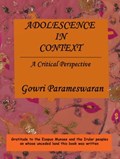This book is a result of the author's academic explorations on the topic of adolescence in contemporary society. The book captures the major findings that relate to adolescence, from both mainstream biological and psychological sciences as well as from other social sciences like history, sociology, anthropology and cultural studies. Theories, concepts and ideas are examined from a variety of disciplinary perspectives and with a critical framework to guide the reader. There are a plethora of opportunities where the reader is invited to apply these ideas in practical work with youth. Some of the areas explored in the book include youth physical development and embodied gender issues, cognitive development and schooling in an era of neo-liberal structural adjustments, family dynamics, social class and its impact, identity and social location, emotional development and relationships within institutions that reproduce social hierarchies, media and media literacy, mental health issues and the social construction of adolescent mental health, and civic engagement.
Adolescence is typically considered by many mainstream psychologists to be universal; if there are manifest differences in how young people live out their years, the differences are considered to lie in social factors that influence the trajectory but that does not change the essential qualities of being an adolescent. This view does not reflect the findings from other disciplines within the social sciences. Researchers in related social sciences have been questioning the assumptions about the inevitability and universality of adolescence. They offer other frameworks to engage with the topic. This book attempts to capture the findings on the topic of adolescence and youth from a variety of disciplines. Historians of childhood are exploring the major historical factors that influenced and continue to influence the concept of childhood and adolescence and the frameworks established to understand them. Sociologists are engaging in ethnographic research with youth participants in the many settings where they are living and functioning and are discovering that adolescence is not one phenomenon, but multiple experiences based on youth social location. While cross-cultural researchers within psychology were asking these questions, they typically do not interrogate the meaning of adolescence in capitalism. Political scientists are exploring the role of youth as citizens and as populations that one can term as oppressed, in that youth have few rights that adults have and few protections that children enjoy. Post-structuralists use theory and language to interrogate the notion of adolescence itself. Historians and postmodernists assert that the term ‘adolescence’ is an outcome of the need for capitalists to establish their superiority in the context of industrialization and colonialism. They write about how language that framed adolescence was often used to control a vulnerable population at a time when science served as a colonial project to subdue whole populations. As the reader enters the world of adolescence in the book, they are invited to think critically about the impact of both scientific and popular ideas about adolescence and the impact of these notions on the life of youth as they interact with the major institutions in society.

